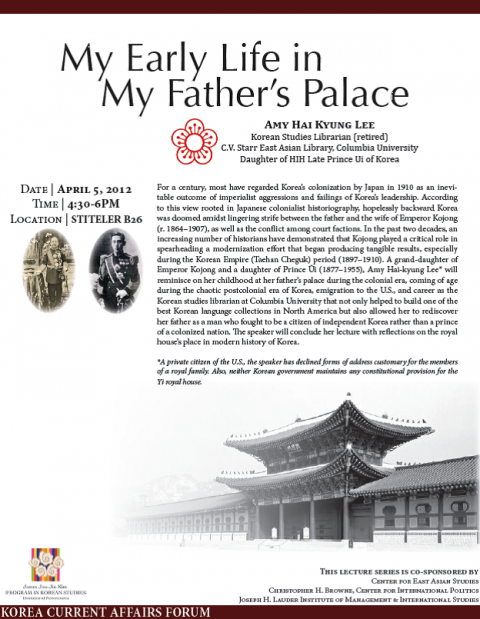
Stiteler Hall, Room B26
Amy Hai Kyung Lee, Korean Studies Librarian (retired), C. V. Starr East Asian Library, Columbia University; Daughter of HIH Late Prince Ŭi (Ŭich'inwang) of Korea
For a century, most have regarded Korea’s colonization by Japan in 1910 as an inevitable outcome of imperialist aggressions and failings of Korea’s leadership. According to this view rooted in Japanese colonialist historiography, hopelessly backward Korea was doomed amidst lingering strife between the father and the wife of Emperor Kojong (r. 1864–1907), as well as the conflict among court factions. In the past two decades, an increasing number of historians have demonstrated that Kojong played a critical role in spearheading a modernization effort that began producing tangible results, especially during the Korean Empire (Taehan Cheguk) period (1897–1910). A grand-daughter of Emperor Kojong and a daughter of Prince Ŭi (1877–1955), Amy Hai-kyung Lee* will reminisce on her childhood at her father’s palace during the colonial era, coming of age during the chaotic postcolonial era of Korea, emigration to the U.S., and career as the Korean studies librarian at Columbia University that not only helped to build one of the best Korean language collections in North America but also allowed her to rediscover her father as a man who fought to be a citizen of independent Korea rather than a prince of a colonized nation. The speaker will conclude her lecture with reflections on the royal house’s place in modern history of Korea.
*A private citizen of the U.S., the speaker has declined forms of address customary for the members of a royal family. Also, neither Korean government maintains any constitutional provision for the Yi royal house.
 James Joo-Jin Kim Center for Korean Studies
James Joo-Jin Kim Center for Korean Studies